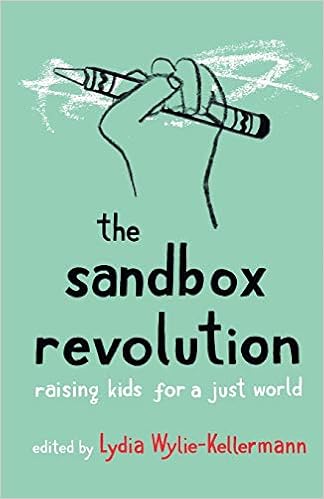Building the Revolution One Sandbox at a Time - a guest book review by Lauren R. E. Larkin
[Rev. Lauren R. E. Larkin is a friend of
the blog, pastor, podcaster,
and author.
In fact, she just published a podcast in which she interviews Ludia
Wylie-Kellermann about this book. Click
here—you won’t want to miss it.]
In form and content, this book in habits and embodies
the realm and material of revolution. By being a collection of experiences told
through stories, Sandbox Revolution refuses becoming a list of dos and
don’ts to shame and guilt beleaguered and fatigued parents with mythological
promises of perfection. Its content speaks uniquely into a void of parenting
literature with a focus on parenting from a perspective to revolution: changing
what is means raising what will be. Wylie-Kellerman and her team present to their
readers the idea that while vengeance is the Lord’s, we who follow Jesus out of
the Jordon are of the Lord’s and thus participant in the battle against vile
systems of destruction and oppression; we take up plows and prune-shears to
push back that which is of death. And vengeance isn’t merely about anger and
destruction but also about love and construction; we can fight death with life.
Wylie-Kellermann asks us to take-up arms…take-up our children into our arms,
lead them by the hand, and show them with our lives (body and soul, mind and
heart) what it looks like to plow that earth long scorched by capitalistic
human infrastructure. May our words and deed break that ground; the kids are
watching.
The text is broken in to three parts with about five
to six entries per part showcasing nearly 20 different perspectives. 20
different perspectives on various aspects of parenting life and issues
commonly confronting parents. The parts are:
- “The Nitty Gritty
Decisions as Radical Practices
- Confronting the
“Isms” in our Families
- Reclaiming Community
Part
one starts with Nick Peterson’s redefining and extending the term and idea of
“family” while contending with his infertility. The turn is to Susan Taylor’s
bold discussion of money and economic justice and what it looks like to raise
children into ownership of their selves and capital. Kate Foran steps in
reimagining education while retrieving homeschooling from evangelical American
Christianity. Kate hands it over to Frida Berrigan as she dares to know what it
means to live somewhere in both its sordid and delightful histories. Finally,
Dee Dee Risher discusses opening space and time for children’s spirituality to
develop on their terms.
Part two begins with Jennifer Castro’s discussion
about how the ideologies (both from church and society) must be reconsidered
and challenged in the process of self-actualization. Jennifer Harvey picks up
the mantel to address the timely necessity of breaking socially constructed
white-privilege rules of dominant culture to confront rampant racism surging
from coast to coast, with Sarah and Nathan Holst tackling patriarchy and how to
combat its ever-present reality in “cross-gender partnerships” (there’s no
escaping it so we must be diligent) (117). Janice Fialka addresses the
detrimental impact of emphasizing ableism as she and her partner navigate the
unknown terrain of parenting a child with disabilities. Connecting humanity to
the earth from which it springs, Michelle Martinez weds together a engagement
with the earth to her Latinx roots and provides a rich reframing of bodies and
community. And Randy Woodley wraps up highlighting storytelling to connect with
the profundity of childlike imagination to envision a better way to live.
The third wraps part up beginning with Marcia Lee and en sawyer addressing what it looks like to build community (across time and space) with the aim to let life blossom in the midst of death. Bill Wylie-Kellermann offers stories about the visceral risks of resistance from the perspective of being a father and then a grandfather woven with his walk of faith. Laurel Dykstra offers both an interview with Leona Brown, a Gitxsan refugee, and her own personal stories of being aware of what she is passing on to her children and what has been passed on to her, balancing tradition and self-development.
Without fail, there’s something held between the light aqua cover of The Sandbox Revolution that will offend. And I mean this in a good way. The book will offend because you will find yourself caught exposed and encouraged, and that paradox is hard to navigate; navigate it, we must! All along, you’ll be encouraged to think differently, act differently, and speak differently. And such encouragement is necessary. Our world is riddled and rattled by pandemic, threatened by collapse and carnage, and submerged in greed and grief; I must confess this is not the world I want my children to inherit. Is it the one you want to pass on? So, with Lydia and her story-tellers I ask, dare we risk raising the next generation and re-raise ourselves into something boldly different? Dare we ask ourselves to live differently in this world to allow space and time to shift and move making room for possibility to bring forth its divine love? Dare we join this necessary, humble, and profound sandbox revolution?
==================================
Follow @SanctaColloquia
Subscribe to Die Evangelischen Theologen

Comments